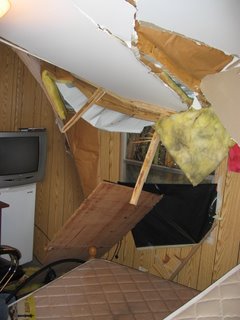If I really wanted to make a quick fortune, I could sell out and write an "insider's memoir" about the "debacle" in Iraq. I could dish all sorts of gossip about the gross incompetence I saw in the Pentagon's handling of post-war Iraq, followed by a gripping depiction of how the pro-war idealism I was brainwashed with while at the White House was shattered by the reality I encountered serving in Baghdad. I have no doubt that the hefty advance I'd collect from publishers, not to mention my speaker's fee on the lecture circuit, would easily pay for my son's college education eighteen years from now.
Of course, such a book would suffer from the handicap of being primarily fiction. Yet that hasn't stopped numerous other authors from writing book after book labeling the war in Iraq as an abject failure even as it is still being fought. In fact, a lack of accuracy wouldn't be much of an impediment to garnering critical praise.
Take, for example, Rajiv Chandrasekaran's "Imperial Life in the Emerald City: Inside Iraq's Green Zone," which yesterday was announced as a finalist for the National Book Award. The thesis of Chandrasekaran's book is that young and inexperienced neoconservative political hacks and Bush loyalists screwed up Iraq's reconstruction in contradiction of the sage advice of State Department and other non-partisan (re: Democratic). This is certainly a plausible hypothesis, given that there were many mistakes made by the Coalition Provisional Authority in its year-plus of existence, and that many young people -- some with Right-of-Center political backgrounds -- were among the first to volunteer to serve in Iraq.
However, the guys at Powerline have effectively debunked the series of articles in the Washington Post intended to promote the book
here,here, and
here. And now Dan Senor, who served as a senior adviser in the CPA, effectively destroys Chandrasekran in his piece in
Tuesday's Washington PostI will let you read Senor's takedown yourself. But he devastatingly shows that while Chandrasekaran focuses on junior staffers, he completely ignores senior CPA officials who had served as Undersecretaries of Defense (David Oliver, Walt Slocombe) or Ambassadors in the Middle East (Ryan Crocker, Richard Jones) in the Clinton administration, senior military officials with more than 50+ years of senior leadership experience (Gen. Keith Kellogg and Vice Adm. Scott Redd), as well as several academic experts (Larry Diamond, Noah Feldman) who had prominently opposed the liberation of Iraq in the first place. In other words, Chandrasekran omits all evidence that contradicts his increasingly flimsy premise.
Moreover, he ignores the fact that the State Department consciously chose to sit out the first year of Iraq's reconstruction. To quote George Packer, whose
The Assassins' Gate is extremely critical of the Bush Administration's handling of the war:
And yet during the life of the CPA, the State Department didn't send all its best people to Iraq, even after the Pentagon's influence waned and Bremer began to use his back channel to Powell more and more. A department official said of the Bureau of Near Eastern Affairs, the archenemy of the neoconservatives, "We didn't do our best job to get things uncocked or to help. I watched NEA, for example, essentially say, 'Okay, you don't want us -- fuck you.' And then from there on out it was, 'Let's see what impediment we can put in their way. Let's see how long we can be in delivering this particular commodity or individual or amount of expertise. Let's see how long we can stiff 'em.'"
Things are not much better today. I have the highest admiration for my State colleagues who are here in Iraq with me. However, the Mission is still short on political officers who speak Arabic, to the point where an Iraqi-American Navy Lieutenant I know was snagged by the Political-Military section because of his language/cultural skills, despite having deployed to Iraq to serve a six-month tour as a dentist! FS-4's (the entry level for foreign service officers) fill jobs that are held by FS-2's (FSO's with about 10 years experience) in just about every other embassy in the world. My friends from the Civil Affairs Course consistently complain about the lack of State Department personnel in the Provinicial Reconstruction Teams on which they serve outside of Baghdad.
Again, this does not mean that the junior FSOs posted here don't deserve admiration for their dedication and service to their country. They should be credited for their service. However, the major difference between their collective skill sets/experience and those of the junior CPA officials was that they have been trained to write State Department cables. It is therefore a shame that Chandrasekaran chooses to bash young, patriotic Americans with the same relative level of expertise as many of those he'd label as "experts" currently serving in Iraq.
I don't think my tell-all could end up being any more selective in its use of evidence or biased in its conclusions if I tried. Maybe I'll win a Pulitzer.

